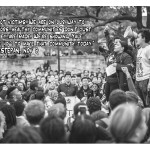After missing my period in December of 2016, I began to get a little nervous. I’ve always been a bit of a hypochondriac, assuming the worst of any abnormality in health. I called my mom. She soothed my worst assumptions, then gently suggested that I make an appointment with my doctor back home. I agreed. I anticipated my doctor would tell me I was just being paranoid. But that didn’t happen.
She was close to calling the missed period a fluke, but towards the end of my appointment, I felt it appropriate to mention that my mom had been concerned that I was maybe going overboard with my endeavors to be healthy. I was sure that I was right in this situation – I was eating what everyone online and at school said I should be, and running 30-60 minutes a day to boot. I only brought up my mom’s concerns so that I could go home and assure her that the doctor said it was fine.
The next fifteen minutes were excruciatingly slow, painful to recall even now. My doctor, who had noted and dismissed my twelve-pound weight loss at the beginning, decided to check on a few other things: body fat, basal metabolic rate (the rate at which one’s body burns calories), and metabolic age (the age I should be given based on my metabolic rate). She had me step on a special scale– one that looked no different from your normal bathroom appliance– and my stomach dropped in dread as the numbers appeared.
I was never officially diagnosed with an eating disorder, but once the facts were laid in front of me, immediately knew that I had developed a real problem. My primary care doctor is not a psychiatrist, and was hesitant to label my mental condition, but she was clear: no more restrictive eating until I gained back 5-7 pounds, please. No big deal. Just chill out a little on the obsession with clean eating.
I realized the severity of the situation at least an hour later after I had left my doctor’s office. , I began to feel clammy. How was I going to tell my parents? My friends? My coach? I was mortified, embarrassed, and most of all, utterly ashamed that I had allowed this to happen. I had never hated myself so much.
But how was I going to even begin those conversations? I had trained myself into a militant mindset that rejected basically anything that wasn’t a raw vegetable. Minimum calories possible, please. I truly thought I was being healthy. I have a naturally curvy frame– which is common for many Mexican women– so underweight on me looked normal to almost anyone who looked, myself included. Everyone praised how healthy I was, waking up every morning at 7am to do cardio and strictly prohibiting consumption of anything not approved by some nebulous body-image police that my brain had concocted. I still possessed a pretty shapely backside, visible abs, and people constantly commented on how amazing my body was any time I went out with a crop top on. Even though every day was excruciating, constantly berating myself for any thoughts about food yet at the same time always thinking about food.
Upon returning to school at the end of January 2017, I was swept into the overwhelming world of Yale Mental Health and Counseling. Eating disorders are unique mental illnesses because their toxicity brews in your mind yet manifests in your body, which would explain why I was immediately placed on a rigid schedule of up to five health-related appointments per week. I saw my Nutritionist on Tuesday, counseling on Wednesday – sometimes Thursday, and team doctor on Friday every other week. I found myself crying almost every day of the week. The nonstop focus on fleshing out my issues was definitely the most straightforward method to recover, possibly the quickest, but undoubtedly the most painful.
The only person early on in this process who I felt somewhat understood the deep pain and self-doubt was my counselor. It was hard for me to believe that she wasn’t at least somewhat judging me when I laid out some of my incredulously disordered behavior. In my head I knew she had probably seen it all, and that I likely seemed relatively healthy compared to many of her patients, but Pride had fully infiltrated my heart. I was convinced to feel nothing but deep shame about who I had become. I was so sure that as I stammered through the appointment, tears abound, she was hiding some potent mixture of pity and disgust. How could she not, given the state I was in?
So at the end of our fourth week together when my counselor mentioned the support group she ran for women* who also struggled with food, my eyes grew wide with apprehension. I could feel my face morph into a scowl. How would forcing a conversation with these people every week help me in any way? I didn’t want to hear about their problems– I had enough of my own to grapple with.
“Just think about it,” she said. “You can try it next week, along with our normal individual session. And if you don’t like it, we can always go back to one-on-one. But it’s a good group of girls, and I think you’d have a lot to add.”
The scowl remained. “Ok,” I heard myself reply, “I’ll give it a try.”
And so came the following Thursday, one day after my normal individual session, and my stomach was clenched in anticipation. As I knocked on my counselor’s door, about to enter a room that had become something of a haven for me, I was feeling anything but safe. My most prominent expectations quickly flashed across my mind: skinny, sullen white girls who didn’t talk, move, or acknowledge much, all sitting in a circle with their heads down. I expected young women whose issues would be obvious just by looking them in the face. I expected the support group atmosphere to be an awkward, tedious one, where my counselor would serve as the sole energy that everyone just let bounce off of them, joy having become permanently absent and unwelcome in their regular lives. I grabbed the door handle, stood up straighter, and took a deep breath in anticipation of yet another painful fifty minutes.
The minute I opened the door, every face greeted me with a smile. The seats were arranged in a circle, and the four of us were waiting for two more. While we waited, my counselor and one of the girls, Mary*, chatted animatedly about Mary’s lab and some of her current research. I sat bewildered at the normalcy of the atmosphere, the relief washing over me like a glass of cold water spreads slowly across your chest. Diane, the girl to my right, politely inquired about me. I responded with the typical Yale details: year, college, major, blah blah blah– that early conversational stuff I normally cringe at but took such solace in while attempting to gather myself in this unfamiliar space. Once our last two joined, my counselor addressed the group, “Are we ready to start?” I held my breath and hesitantly nodded with the others.
The girls in this group were not skinny. At least, not in the way people with eating disorders are typically portrayed: sickly, with sunken cheeks that make your stomach flip and heartbreak. I was one of only two group members who classified their tendencies as anorexic– the rest struggled with binge-eating.* These women ranged from 5’ 2” to 5’ 9”, varying in body shapes and size. They also were not all white, three being women of color– a surprise to me perhaps because of the common association between mental illnesses and white people. They spoke with fervor and excitement, visually energized by moments as small as finishing their latest essay. When they explained their lows, their faces fell slightly, but all attempted to maintain at least a slightly positive tone, as though things were really not so bad and they were confident next week would be better.
I walked out of Yale Health on that Thursday completely floored. To this day I still could not tell you what I said in this first meeting. The women in this group were all in different phases of their recovery; some had been coming to Group for over a year, others for only two weeks. Some felt they had already climbed mountains, while others were still learning how to walk again. What united us was a simple desire to get better– to gather in a community where we speak about unspeakable topics in search of our personal healing. Since that fateful day in January, I had never felt so comfortable or accepted as I did in that office.
By the end of the semester, my highs and lows at Group were hardly ever about food. I made some enormous personal decisions in that third floor room at Yale Health because of these Thursday meetings. I ended toxic friendships, removed myself from Yale’s hook-up culture, and quit my varsity sport. I was done doing things that made me unhappy and finally began experiencing some peace.
I never truly understood the power of discussing one’s struggles until I actually talked through my own mental illness in a safe, supportive environment. I cannot describe how essential the discussions at group were to my recovery. The fact that I was a part of this small community of people who were actively working to help themselves– a challenge not often pursued at Yale– gave me energy, then hope, and finally, confidence.
________________________________________________________________________
* Eating disorders affect all genders. According the National Eating Disorder Association, 20 million women and 10 million men will suffer from a clinically significant eating disorder at some point in their life. https://www.nationaleatingdisorders.org/learn/general-information/research-on-males
* Binge Eating Disorder (BED) is a serious eating disorder in which you frequently consume unusually large amounts of food and feel unable to stop eating. Although only officially recognized as an eating disorder in 2013, studies show that 3.5% of women and 2.0% of men will have BED in their life, making it three times more common than anorexia and bulimia combined (https://www.nationaleatingdisorders.org/binge-eating-disorder).
*Names changed for confidentiality
The National Eating Disorders Association Information and Referral Helpline can be reached 1-800-931-2237
Sydney Babiak DC’19 / She can be reached at sydney.babiak@yale.edu



